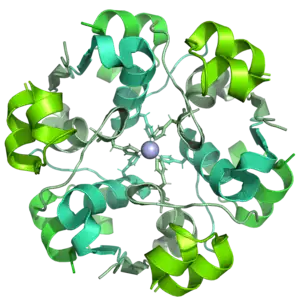Insulin glulisine
 PDB: 6gv0 | |
| Names | |
|---|---|
| Trade names | Apidra, Apidra SoloStar |
| Clinical data | |
| Drug class | Insulin (rapid acting)[1] |
| Main uses | Type 1 and type 2 diabetes[1] |
| Side effects | Low blood sugar, pain at the site of injection[2][1] |
| WHO AWaRe | UnlinkedWikibase error: ⧼unlinkedwikibase-error-statements-entity-not-set⧽ |
| Pregnancy category | |
| Routes of use | Subcutaneous, intravenous |
| External links | |
| AHFS/Drugs.com | Monograph |
| MedlinePlus | a607033 |
| Legal | |
| License data |
|
| Legal status | |
| Chemical and physical data | |
| Formula | C258H384N64O78S6 |
| Molar mass | 5822.64 g·mol−1 |
Insulin glulisine, sold under the brand name Apidra, is a rapid acting insulin used to treat type 1 and type 2 diabetes.[1] It is given by injection under the skin between 15 minutes before to 20 minutes after starting a meal.[1] It may also be used by injection into a vein.[4] It is generally used with a long acting insulin.[1]
Common side effects include low blood sugar and pain at the site of injection.[2][1] Other side effects may include allergic reactions, low potassium, and lipodystrophy.[1] It is made by recombinant DNA techniques.[2]
Insulin glulisine was approved for medical use in the United States and Europe in 2004.[1][2] In the United Kingdom 300 units costs the NHS about £6 as of 2021.[5] In the United States this amount costs just over 100 USD.[6]
Medical uses
Insulin glulisine is indicated for the treatment of diabetes mellitus.[2][4]
Dosage
The typical dose of all insulins in type 1 DM is 0.2 to 1 unit/kg per day.[1]
Chemistry
It differs from human insulin in that the amino acid asparagine at position B3 is replaced by lysine and the lysine in position B29 is replaced by glutamic acid.[7]
History
It was developed by Sanofi-Aventis.[8]
References
- 1 2 3 4 5 6 7 8 9 10 "Insulin Glulisine Monograph for Professionals". Drugs.com. Archived from the original on 8 August 2020. Retrieved 26 November 2021.
- 1 2 3 4 5 6 "Apidra EPAR". European Medicines Agency (EMA). Archived from the original on 10 October 2020. Retrieved 7 October 2020.
- 1 2 "Insulin glulisine Use During Pregnancy". Drugs.com. 6 April 2020. Archived from the original on 4 December 2020. Retrieved 21 September 2020.
- 1 2 3 "Apidra- insulin glulisine injection, solution Apidra SoloStar- insulin glulisine injection, solution". DailyMed. 6 December 2019. Archived from the original on 25 March 2021. Retrieved 21 September 2020.
- ↑ BNF 81: March-September 2021. BMJ Group and the Pharmaceutical Press. 2021. p. 754. ISBN 978-0857114105.
- ↑ "Apidra Prices, Coupons & Savings Tips". GoodRx. Archived from the original on 11 December 2021. Retrieved 26 November 2021.
- ↑ "Apidra (insulin glulisine) injection, solution". DailyMed. Archived from the original on 2010-06-15. Retrieved 2020-12-02.
- ↑ Jasek W, ed. (2007). Austria-Codex (in Deutsch) (2007/2008 ed.). Vienna: Österreichischer Apothekerverlag. ISBN 978-3-85200-181-4.
External links
| Identifiers: |
|---|
- "Insulin glulisine". Drug Information Portal. U.S. National Library of Medicine. Archived from the original on 2020-10-24. Retrieved 2020-12-02.